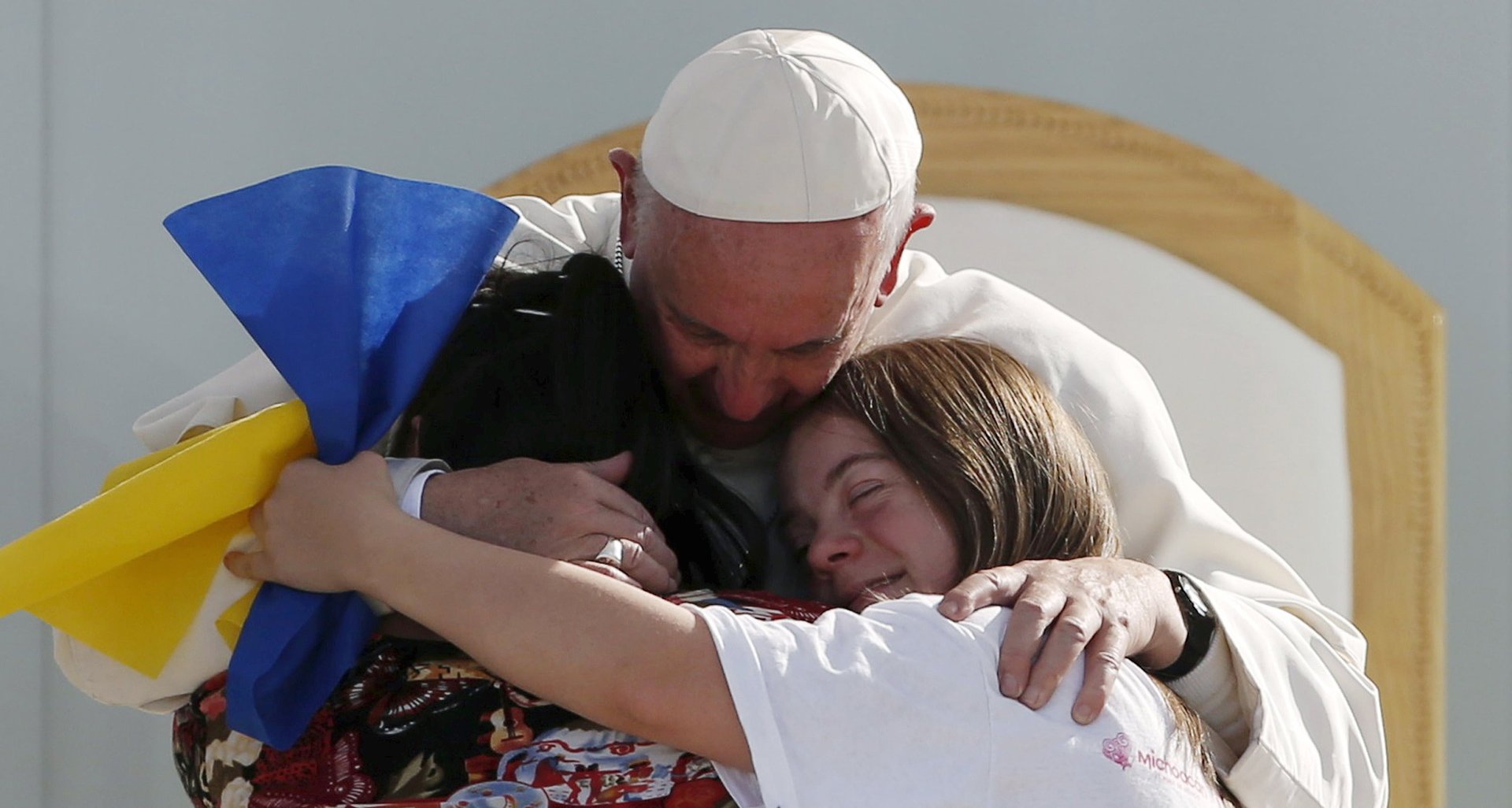Pope Francis’s contraception comments highlight the Catholic Church’s hypocrisy, not progress
Did the Pope did not just give Catholics the go-ahead on condoms?


Did the Pope did not just give Catholics the go-ahead on condoms?
Speaking to reporters aboard a Vatican plane after a five-day trip to Mexico, Pope Francis suggested this week that it is okay to use condoms to prevent transmitting Zika infections. The epidemic, which began in Brazil last May, has been linked to birth defects currently ravaging parts of Latin America. In embargoed comments released Thursday (Feb. 18) by reporters who had traveled with him on the flight, the Pope said that abortion was “evil” but “avoiding pregnancy is not an absolute evil.”
The words quickly made headlines worldwide—and sent phones buzzing with news alerts—as media outlets heralded a possible shift in the church’s longtime ban on contraception. The quote quickly joined other now-famous sound bites from Francis, who has become known for his off-the-cuff and seemingly progressive remarks on everything from LGBT issues to the salvation of atheists.
But upon closer inspection, “cool pope” Francis may not quite be the game changer his reputation implies. Viewed through a historical lens, the ever-polarizing Catholic Church continues to confound world leaders with its positions on family planning and disease prevention. While it’s largely stood firmly against proven methods to prevent pregnancy and HIV and AIDS, the church is also one of the largest global private providers of care for people with HIV and AIDS, and has been hailed by governments for its adoption agencies, orphan shelters, and hospitals. It’s notable that the Pope chose to address the use of condoms when it comes to Zika after rebuffing a similar question regarding condoms and the spread of HIV during an in-flight presser on his way back from Africa in November.
This dichotomy—some have accused the church of hypocrisy—contributes to the church’s complex legacy. Indeed, global health advocates and women’s rights activists have long criticized the Catholic Church’s record on contraception. For generations, it was generally accepted that artificial contraception was a no-go under church rules, a position that was also common in Protestant churches. But as condom usage spread following the invention of latex in the early 20th century, Protestants began to loosen their views on condoms, and the Vatican was forced to reexamine its stance.
In 1968, just a few years after the conclusion of the Second Vatican Council reforms that liberalized some aspects of the church—such as allowing people to worship in their native languages instead of Latin—Pope Paul VI released his famous (or infamous, depending on your viewpoint) encyclical Humanae Vitae. The lengthy treatise on “married love” and “responsible parenthood” labeled artificial contraception as evil. The arguably more difficult rhythm method, on the other hand, was okay.
These definitions have lasted today, though global health standards—and threats, perhaps most notably the international rise of HIV and AIDS—have changed dramatically. Popes John Paul II, Benedict XVI, and Francis himself have been repeatedly challenged on the use of condoms, as well as the church’s position on abortion. Many of the world’s approximately 1.1 billion Catholics see their answers as mixed messaging.
Until Thursday, the most famous words on condoms had come from Benedict in 2010. In the book Light of the World, which journalist Peter Seewald wrote after six hours of interviews with the then-pope, Benedict said condoms were not “a real or moral solution” to the spread of HIV and AIDS but could be “a first step in the direction of a moralization, a first assumption of responsibility” on behalf of people who were HIV-positive.
Benedict was criticized at the time by church conservatives for promoting moral relativity. And Francis has also come under fire for his comments, which cited a little-known case in which Pope Paul VI gave permission to nuns who were under threat of rape in 1960s Belgian Congo to use oral contraceptives. “Unfortunately the Pope has once again caused confusion with his off-the-cuff statements,” John-Henry Weston, editor-in-chief of conservative Catholic website LifeSiteNews, tells Quartz. “He seems to indicate that for serious reasons couples may choose to use artificial contraception. That would legitimately cause Catholics to wonder about all sorts of other situations where artificial contraception was previously forbidden such as the case of a likelihood of having children with genetic defects.”
Alternatively, Christopher J. Hale, executive director of the liberal group Catholics in Alliance for the Common Good, argues that the Pope was merely following past precedent.
“Despite the fanfare surrounding his comments, Pope Francis today is just reiterating Catholic teaching on the issue,” he tells Quartz. “According to church teaching, there are narrow circumstances where the use of the contraception might be permissible. Those who think this signals the church changing its teaching on contraception will be disappointed.”
Much has been made about Pope Francis’s liberalizing worldview. And on issues such as climate change, immigration, and Vatican bureaucracy he certainly has pushed for reforms. But when it comes to a reproductive and sexual health, the Pope’s recent statements signal limited reprieves, not structural changes, say experts.
“I don’t think what the pope said about contraception was all that different from what Benedict said about condoms and AIDS in 2010,” explains Charles C. Camosy, an associate professor of theological and social ethics at Fordham University who authored Beyond the Abortion Wars. “The pope’s manner, his affect, his being pastoral, that has been different in ways the previous two popes were not. But in terms of substance, there has not been much change. The church is pretty set on its positions.”